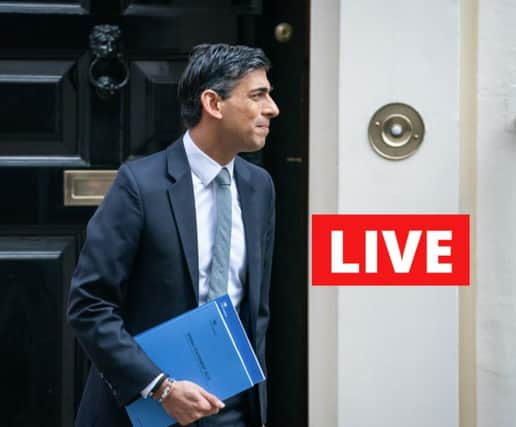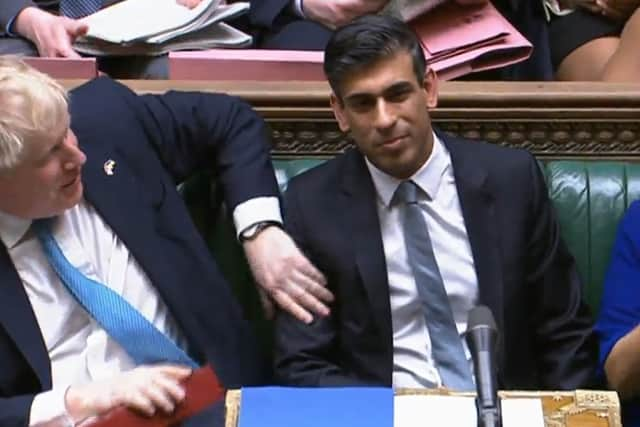Spring statement 2022: RECAP as Rishi Sunak cuts fuel duty and VAT on energy saving devices


But he acknowledged the impact of inflation, which is at a 30-year high, and the global economic uncertainty caused by Vladimir Putin’s invasion of Ukraine.
The Office for Budget Responsibility (OBR) downgraded growth in gross domestic product – a measure of the size of the economy – from the 6% forecast for this year at the time of the Budget in October to just 3.8%.
Advertisement
Hide AdAdvertisement
Hide AdMr Sunak said “it is too early to know the full impact of the Ukraine war on the UK economy” but the OBR acknowledged there was “unusually high uncertainty” around the economic outlook.
The cost-of-living crisis driven by rising fuel and energy prices was set to be exacerbated in April by the 1.25 percentage point hike in national insurance to fund the NHS and social care.
But Mr Sunak unveiled a £6 billion plan to increase the threshold at which people start paying national insurance contributions (NICs) by £3,000 to £12,570 from July.
Mr Sunak said it was “a £6 billion personal tax cut for 30 million people across the United Kingdom, a tax cut for employees worth over £330 a year”.
Mr Sunak said around 70% of workers would have their tax cut by more than the increase coming in April.
And he promised further support in 2024 with a pledge to cut the basic rate of income tax from 20p in the pound to 19 – “a £5 billion tax cut for over 30 million people”.
Rising energy, goods and food prices helped push inflation to increase 6.2% in the 12 months to February, Office for National Statistics (ONS) figures revealed on Wednesday morning, hours before Mr Sunak’s speech to the Commons.
You can follow live updates from the Spring Statement in our live blog.
Spring statement 2022: Live updates on UK Spring Statement from Rishi Sunak
BREAKING: The chancellor announces that government will raise the threshold people earn before they pay National Insurance.
He says: “From this July, people will be able to earn £12,570 a year without paying a single penny of income tax or National Insurance,”
Rishi Sunak says a new tax cut for small businesses, an allowance for workers they employ, will save them up to £1,000.
He also says the business rates discount coming into effect next month for retail, hospitality and leisure businesses will save them up to £110,000.
Rishi Sunak told MPs he would publish a “tax plan” in which he wanted to reduce and reform taxes over the Parliament, and insisted the health and care levy will stay.
He said: “But a long-term funding solution for the NHS and social care is not incompatible with reducing taxes on working families.”
He went on: “Our current plan is to increase the NICs threshold this year by £300, I’m not going to do that – I’m going to increase it by the full £3,000, delivering our promise to fully equalise the NICs and income tax thresholds.
“And not incrementally over many years, but in one go, this year. From this July, people will be able to earn £12,570 a year without paying a single penny of income tax or National Insurance.
“That is a £6 billion tax cut for 30 million people across the UK. A tax cut for employees worth over £330 a year. The largest increase in a basic rate threshold ever. And the largest single personal tax cut in a decade.”
Rishi Sunak announced his intention to cut the basic rate of income tax before the end of the current Parliament in 2024.
He told MPs: “A clear goal for Conservative chancellors, and even some Labour ones, has been to cut income tax. The fact this has only happened twice in 20 years tells you how hard it is to do.
“Covid and the war in Ukraine have only added to the difficulty of achieving this by the end of this Parliament.”
Labour Shadow Chancellor Rachel Reeves says Rishi Sunak could have put a windfall tax on energy companies, or properly cut his national insurance increase, but opted not to.
She says that Sunak’s choices are making the cost of living crisis worse.
Boris Johnson congratulates Chancellor of the Exchequer Rishi Sunak after he delivered his Spring Statement in the House of Commons


On the fuel duty cut, Rob Morgan, Investment Analyst at Charles Stanley, said: “5p cut in fuel duty amounts to about £50 a year for average car use, clearly helpful for motorists and even more so for transport industry but not a big move given the huge increase in prices at the pumps over the past couple of months.”
Rachel Reeves tells the Commons: “Today was the day that the Chancellor could have put a windfall tax on oil and gas companies to provide real help to families, but he didn’t.
“Today was the day the Chancellor could have set out a proper plan to support businesses and create good jobs. But he didn’t.
“Today was the day he could have properly scrapped his national insurance hike, he didn’t.
“We said it was the wrong tax at the wrong time, the wrong choice. Today, the Chancellor has finally admitted he got that one wrong.
“Inflation is at its highest level for 30 years and rising. Energy prices at record highs. People are worried sick.
“For all his words, it is clear that the Chancellor does not understand the scale of the challenge. He talks about providing security for working families, but his choices are making the cost-of-living crisis worse, not better.”
